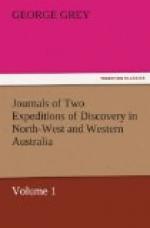Signs of natives.
We halted for breakfast near a stream of this kind, under the shade of a large group of the pandanus. This was evidently a favourite haunt of the natives, who had been feeding upon the almonds which this tree contains in its large complex fruit, and to give a relish to their repast had mingled with it roasted unios, or fresh-water mussels, which the stream produced in abundance. The remains of some old spears were also lying about, but the natives themselves were not visible.
Immediately after breakfast I ascended a hill to see if we could in any way get clear of the deep stream on the banks of which we had breakfasted. The Glenelg was distant about three miles to the south, and I found that, in order to disengage ourselves from the waters which almost encompassed us, we must turn off to the north-west, and thus almost double back on our former track, as there was no other resource. I returned at once to the party, and we spent the rest of the day in crossing two deep streams, and then proceeded about a mile to the eastward, where we halted for the night on the bank of a rocky watercourse, but not containing a drop of water. The timber today was larger than I had yet seen it, affording many new kinds, and one in particular, resembling in appearance and quality the English ash.
March 9.
We moved through a low country, densely vegetated, and still abounding in deep sluggish streams, almost unapproachable, on account of a dwarf bamboo and other tropical plants which clothed their margins. Some of these streams were twenty feet deep and upwards, and looked more like canals than natural watercourses.
Cascade of the river.
The point where we halted for the night was not very distant from the river, for its roaring, as it forced itself over a rapid, could be distinctly heard. As it was important to ascertain if it ceased to be navigable at this point, as well as whether it could be here forded or not, I ordered a party to proceed at daylight and examine it, and in the interim we laid down to enjoy such repose as myriads of mosquitoes would allow us.
March 10.
The party started at dawn and did not return until the afternoon. They arrived at low-water at a point where the river formed a series of rapids and was apparently broken into several channels; the one which they reached was not more than fifty or sixty yards wide, the tide at low water being full seven or eight feet below the level of the rocks which formed the rapids, but at high-water it rose, judging from the marks on the rocks, as many feet above them. This channel would therefore cease to be navigable for vessels at this point, but large boats could proceed up it at high-water. There was no apparent possibility of our being able to pass it hereabouts on account of the great rapidity of the current. The river continued fresh below the rapids, and their account of the character of the country they saw was most satisfactory.




